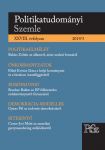Iszlám és demokrácia Indonéziában: egy konszenzus-orientált modell felé?
Islam and democracy in Indonesia: towards a consensus-oriented model?
Author(s): Pál István GyeneSubject(s): Government/Political systems
Published by: MTA Politikai Tudományi Intézete
Keywords: Indonesia; democratization; party system; political islam
Summary/Abstract: The present paper studies the possibilities of adapting political democracy to Southeast Asia, more particularly to the context of Islam in Indonesia. We argue that the impact of the ”Islam” factor on the Indonesian political system is worth studying on three different levels: 1. on the level of society’s political divisions: the relationship to Islam and the state’s secular nature still seems to be the most fundamental political cleavage in Indonesian society; 2. on the level of the party system: investigating the position and role of parties on the platform of political Islam; 3. last but not least, on the level of parliamentary politics, examining the extent to which the secular and Islamic parties are influential actors in legislation and in the executive branch. While in the first two dimensions, i.e. as a social dividing line and a difference visible in the formation of the party system, the separation of secular and “Islamic” political subcultures is tangible up to the present day, the parliamentary dichotomy of government and opposition does not reflect this separation. The current government coalition, for example, is composed of secular, traditionalist and modernist Muslim parties, and the profile of the political opposition is also similar. I contend that there is a specifically Indonesian “consensus-oriented” democracy model in the process of formation, which however is not without western prefigurations, where political Islam and Islamist parties do not act as destabilizing factors, but on the contrary, as a kind of “Muslim democratic” force strengthening democratic consensus similarly to the functioning of some “western” Christian democratic parties. The research is partly based on a historical and, implicitly, a comparative approach. It strongly builds on the theoretical framework and methodology of Sartori’s classic party system typology, Lijphardt’s “majoritarian” and “consensus-based” democracy model, and the so-called neo-Institutionalist debate on the advantages and possible disadvantages of parliamentary and presidential forms of government.
Journal: Politikatudományi Szemle
- Issue Year: XXVIII/2019
- Issue No: 3
- Page Range: 87-108
- Page Count: 22
- Language: Hungarian

